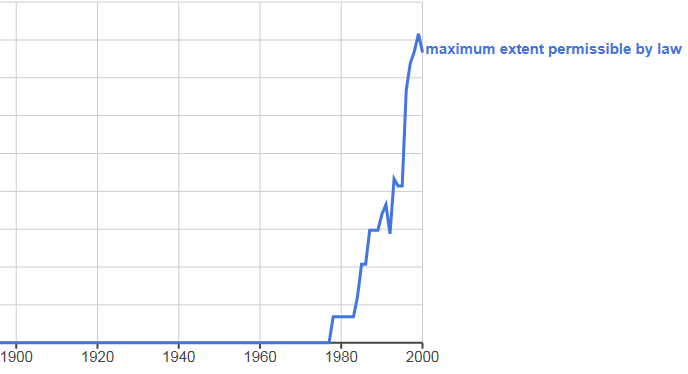To the fullest extent permissible by law: Difference between revisions
Amwelladmin (talk | contribs) No edit summary |
Amwelladmin (talk | contribs) No edit summary |
||
| Line 14: | Line 14: | ||
“Okay, okay, I ''get'' it. You aren’t responsible. ''Jesus''. Calm ''down'' already.” | “Okay, okay, I ''get'' it. You aren’t responsible. ''Jesus''. Calm ''down'' already.” | ||
Now should it transpire that the | Now, should it transpire that the fullest extent of the law— and we wuite like the idea there are gentle stretches further down the legal river that aren’t as wet ’n’ wild as the far reaches of its fullest extent — did not allow the Issuer off the hook, well — for investors, happy days; they’re in the money — but even so, the Issuer gains nothing by adding text acknowledging this contingency in the interim. | ||
And ''not'' saying it hardly makes the Issuer’s position worse, does it? | |||
{{egg}} | {{egg}} | ||
{{ref}} | {{ref}} | ||
Revision as of 15:02, 15 November 2022
|
The JC’s guide to writing nice.™
|
It won’t be long in the life of a young lawyer before she comes across this delightfully flannelled subordinate clause:
The Issuer to the maximum extent permissible by law, accepts no liability for the contents of this prospectus...
She might pause briefly, on that first fumbling encounter, and wonder what legal mischief this incantation is calculated to ward off. Does the law assume that any contractual provision is deemed, unless you say to the contrary, to be half-hearted in its intent — a choked nine-iron back onto the fairway from behind a tree, and not a full-throated drive at the green?
God only knows, is this commentator’s remark. God probably doesn’t know either. But a bit of research suggests that this gem found its way into the forensic world some time in the late 1970s. And as you’ll see to the right[1], it has flourished since its introduction.
The lilly-liveredness of this statement makes you shudder. We know for certain that no-one saw fit to make this remark before the 1970s. What is it about the modern world that makes a legal eagle worry so? Does it not, subliminally, sent a contrary message: “I am saying I accept no responsibility, but I tacitly acknowledge that at some level I probably do.”
Whereas the bold statement: “The Issuer accepts no liability for this prospectus” leaves a reader in no doubt where she stands:
“Okay, okay, I get it. You aren’t responsible. Jesus. Calm down already.”
Now, should it transpire that the fullest extent of the law— and we wuite like the idea there are gentle stretches further down the legal river that aren’t as wet ’n’ wild as the far reaches of its fullest extent — did not allow the Issuer off the hook, well — for investors, happy days; they’re in the money — but even so, the Issuer gains nothing by adding text acknowledging this contingency in the interim.
And not saying it hardly makes the Issuer’s position worse, does it?
